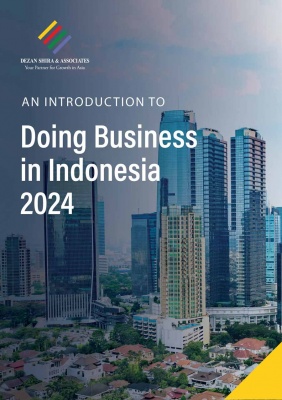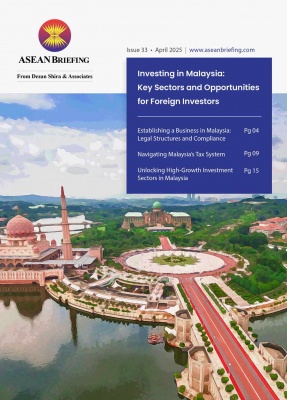Vietnam Decree 23 Outlines Bidding Processes for Key Sectors Projects
Following the enactment of the New Bidding Law, Vietnam’s Decree 23 introduces comprehensive regulations to improve competitiveness and transparency in bidding processes, outlining criteria, procedures, and requirements for investor selection and project implementation in specialized sectors.
Vietnam's New Bidding Law took effect on January 1, 2024, bringing changes to the bidding processes within the country. Subsequently, on February 27, 2024, the government issued Decree No. 23/2024/ND-CP (hereinafter, "Decree 23") to provide detailed guidelines for its implementation, especially concerning investor selection in specialized sectors.
Driven by the need to enhance competitiveness and transparency, Decree 23 introduces new rules for competitive bidding processes in Vietnam. These regulations apply to projects in sectors such as waste treatment, seaports, airports, roads, and water supply, with provisions allowing for potential expansion into additional sectors.
Understanding Vietnam’s New Bidding Law
Adopted by the National Assembly on June 23, 2023, Vietnam’s New Bidding Law addresses various concerns surrounding the selection of investors for project implementation, particularly in sectors like power and infrastructure. By amending the previous Bidding Law, it aims to enhance transparency, fairness, and efficiency in the investor selection process, consequently shaping the investment landscape and fostering further development in Vietnam's key sectors.
Key elements of the New Bidding Law that impact the bidding process include:
- Expansion of scope: The New Bidding Law introduces a new approach to the scope of international bidding, refining the parameters of bidding eligibility by delineating specific situations where international bidding is not permitted.
- Revised criteria for investor evaluation: Under the New Bidding Law, revised criteria for evaluating bids and selecting winning investors are established. This includes a comprehensive assessment of investors' capacity, experience, technical expertise, and financial capabilities, with an emphasis on efficiency in project implementation planning.
- Detailed regulations on project contracts: The New Bidding Law mandates detailed regulations regarding the content of project contracts to be signed with winning investors. Six fundamental components are outlined, ensuring alignment with bid proposals and bid invitations, thereby enhancing contractual clarity and accountability.
- Requirements for contract performance security: A notable provision of the New Bidding Law pertains to contract performance security. Winning investors are now required to furnish performance security, with specific forms of security prescribed by the law. This provision aims to safeguard project execution and mitigate risks associated with investor performance.
Key procedures and provisions of Decree 23
Circumstances mandating bidding for investor selection
The New Bidding Law categorizes projects into two groups, specifying circumstances necessitating bidding for investor selection:
- Group 1: Projects involving land subject to bidding as per land law and regulations.
- Group 2: Projects requiring bidding for investor selection under relevant specialized regulations.
Decree 23 further elaborates on Group 2 projects, outlining eight sub-groups where investor selection bidding is mandatory under Specialized Regulations, known as "In-Scope Projects". These encompass:
- International football-betting business projects;
- Investment projects on domestic solid waste treatment works;
- Dredging projects in port waters and inland waterways;
- Projects on specialized aviation services at airports and aerodromes;
- Projects on specialized road traffic services;
- Investment projects on the renovation and reconstruction of apartment buildings;
- Investment projects on water-supply works and systems; and
- Projects necessitating bidding when multiple interested investors register for implementation, including those in education, vocational training, health, culture, sports, and environment sectors, as well as projects on horse racing, dog racing, and social housing construction.
Exceptions to Decree 23's scope are detailed for projects not subject to bidding for investor selection, including those involving land use right (LUR) transfers, LUR auctions, or land allocation from the state outside of bidding processes as regulated by land laws.
Compulsory conditions for bidding and investor selection
In adherence to Decree 23, In-Scope Projects, particularly those utilizing land, must fulfill the following prerequisites to fall within its application scope:
- Land recovery circumstances: The In-Scope Projects must align with circumstances where the state is mandated to conduct land recovery as per prevailing land regulations. According to Vietnam’s New Land Law, effective January 2025, land may undergo state recovery for purposes related to national defense and security, or socio-economic development for national and public interests. This includes endeavors such as the construction of power plants, associated infrastructure, transmission lines, and substations.
- Exclusion from LUR auctions and public asset auctions: In-Scope Projects should not meet the criteria for land use right auctions as outlined in land regulations. Furthermore, they should not fall within the ambit of public asset auctions governed by regulations on the management and use of public assets.
Bidding procedures for investor selection
Decree 23 delineates two distinct groups of procedures governing the bidding process for investor selection:
- Procedures for open bidding or limited bidding with one-stage and one-envelope method, along with open bidding with one-stage and two-envelope method; and
- Procedures for open bidding with the two-stage and one-envelope method.
Prior to preparing for any of these bidding procedures, the responsible bid solicitor must publicly announce the proposed investment project. If stipulated by land regulations or specialized regulations, an Expression of Interest (EOI) is issued in instances where two or more investors express interest or register for project implementation.
In cases where an EOI is mandated, three possible circumstances arise:
- If two or more investors meet EOI requirements, the bid solicitor proceeds with open bidding according to the specified bidding procedures.
- If only one investor registers and satisfies EOI requirements, or multiple investors register but only one satisfies EOI conditions, an investor approval procedure is conducted as per investment regulations to recognize the qualified applicant.
- If no investor registers or meets EOI prerequisites, the bid solicitor announces the end of the EOI stage, with the option to reorganize or amend the process.
Assessment criteria for submitted bids
Evaluation of submitted bids is conducted based on three key standards, with scores ranging from 0 to 100 or 0 to 1,000. These are illustrated in the table below.
Criterion
Details
Contribution to the total score
|
Assessment Criteria for Submitted Bids |
||
|
Bidder capacities and experience |
This criterion assesses the financial capacities of bidders, determined by factors, such as the total investment capital of the project, capabilities in mobilizing and arranging capital, and past experience in investing, implementing, and operating similar projects. |
This standard contributes to 20 percent to 30 percent of the total score. |
|
Proposed project implementation plan |
Bids are evaluated based on the feasibility and suitability of the proposed implementation plan. This includes considerations of technical, social, and environmental aspects, such as alignment with approved planning by competent authorities and the feasibility of technology application solutions, including potential technology transfer requirements. |
This standard accounts for 20 percent to 50 percent of the total score. |
|
Efficiency of investment and development |
This criterion measures the efficiency of investment in and development of relevant sectors, fields, and localities. It encompasses factors such as the impact on business sectors, local development, and overall economic efficiency. |
This standard contributes to 30 percent to 50 percent of the total score.
|
Additionally, to qualify for consideration, submitted bids must meet the following minimum score requirements:
- The total score achieved by the bid must be at least 70 percent of the total or maximum score available (i.e., 100 or 1000, depending on the scale used).
- For each assessment standard or detailed criterion, the total score attained must be at least 60 percent of the total or maximum score allocated for that specific standard. If the bidding process utilizes the one-stage and two-envelope method, standards related to the bidder's capacities, experience, and proposed project implementation plan must achieve at least 70 percent of the total score for each standard.
- The total score for each criterion must reach at least 50 percent of the maximum score designated for that particular criterion.
The bidder who meets all the minimum score requirements outlined above and attains the highest total score will be ranked in first place.
Requirements for establishing the project company
Upon winning the bid, if the successful bidder is domestic, it has the option to either directly execute the project or establish a new project company for implementation.
However, if the winning bidder is foreign, it must establish a project company.
Decree 23 stipulates the following conditions for the project company established by the winning bidder:
- The winning bidder must possess 100 percent equity capital in the project company.
- The project company must assume all rights and obligations pertaining to project implementation as committed by the winning bidder in its bids and project contracts.
- The project company must fulfill all incorporation and operational requirements in accordance with regulations on enterprises, investment, construction, land, and specialized sectoral regulations.
- The project company is permitted to transfer the investment project only after fulfilling all conditions specified under Article 76.2 of the New Bidding Law, as well as other conditions outlined in investment regulations and relevant specialized regulations.
Decree 23 additionally allows the winning bidder to increase the capital of the project company for the purpose of undertaking other investment projects, if applicable. However, it is crucial to ensure that such capital increase does not impinge upon the rights and obligations agreed upon by the winning bidder and the project company in the bid and the project contract.
Conclusion
In summary, Decree 23 brings forth substantial regulations aimed at bolstering the competitive bidding process for investor selection across pertinent sectors. These regulations encompass:
- Defining specific groups and sectors for project allocation, while also detailing circumstances necessitating competitive bidding under specialized regulations, alongside exceptions.
- Imposing explicit land status prerequisites for projects to qualify for investor selection via bidding procedures.
- Systematically categorizing and elucidating diverse bidding methodologies and protocols tailored to investor selection for these projects.
- Establishing comprehensive criteria, conditions, and mechanisms for evaluating bids submitted by investors.
- Mandating the formation of project companies tasked with overseeing the execution of awarded projects, thereby ensuring effective project management and implementation.
Through these measures, Decree 23 not only aims to foster a more competitive and transparent bidding environment but also strives to promote efficient project execution and facilitate sustainable development across critical sectors within Vietnam.
This article first appeared on Vietnam Briefing, our sister platform.
About Us
ASEAN Briefing is produced by Dezan Shira & Associates. The firm assists foreign investors throughout Asia and maintains offices throughout ASEAN, including in Singapore, Hanoi, Ho Chi Minh City, and Da Nang in Vietnam, in addition to Jakarta, in Indonesia. We also have partner firms in Malaysia, the Philippines, and Thailand as well as our practices in China and India. Please contact us at asean@dezshira.com or visit our website at www.dezshira.com.



















